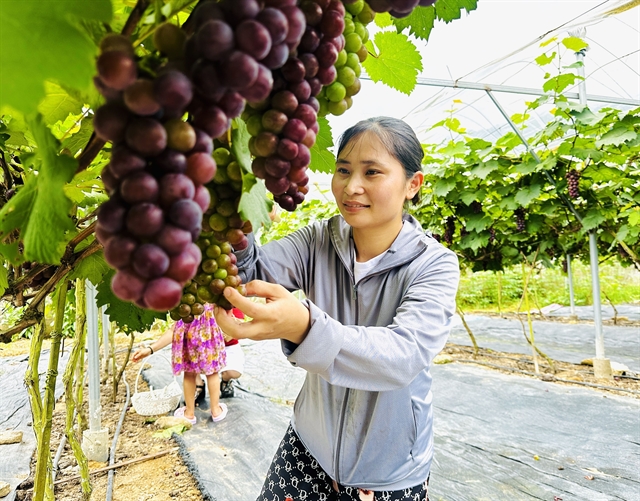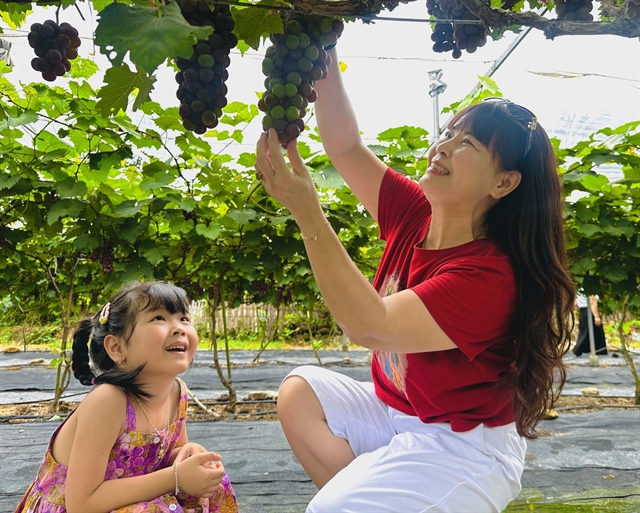 Society
Society


|
| Workers at the Hạ Đen Vineyard in Cường Thịnh Hamlet, Thanh Thủy Commune in the mountainous northern province of Tuyên Quang.—VNA/VNS Photo Đức Thọ |
TUYÊN QUANG — In the final days of June, the narrow road leading to the Hạ Đen Vineyard in Cường Thịnh Hamlet, Thanh Thủy Commune in the mountainous northern province of Tuyên Quang is alive with the hum of visitors and vehicles.
Once a quiet agricultural plot, the Hạ Đen Vineyard has now become a popular destination for both locals and tourists.
Nguyễn Thị Hồng Hạnh, a resident of Thanh Thủy Commune and owner of the vineyard, is the pioneering force behind the thriving agricultural venture.
In 2022, she took a bold step by choosing to cultivate the Hạ Đen grape variety as the foundation of her start-up, driven by a desire to pursue clean agriculture and transform the rural economy.
At the time, her family faced considerable financial hardship, and their farmland yielded little in return.
Hạnh had experimented with various crops, but none brought significant income or promise.
Seeking a new direction, she began researching plants with high potential and eventually discovered the seedless, high-yield Hạ Đen grape, a variety well-suited to the local soil and climate.
“In the early days, we had to take out loans to invest in the vineyard and build protective netting,” she said.
But the initial results were disappointing. Many vines withered and few bore fruit.
“We lost everything that first season,” she said.

|
| Nguyễn Thị Hồng Hạnh, owner of the vineyard. —VNA/VNS Photo Đức Thọ |
However, she said that with each harvest, they improved their technique and adapted their approach. Gradually, the vines began to thrive, producing more fruit and higher yields.
Through three years of persistence and the application of modern farming techniques, Hạnh has transformed her family’s once unproductive land into a flourishing vineyard.
Today, the venture generates nearly VNĐ100 million (approximately US$3,800) annually, providing her family with stable income and a path to prosperity.
Covering over 1,000sq.m and home to more than 400 grapevines, the vineyard is equipped with a semi-automated drip irrigation system, plastic mulch for moisture retention, and drainage ditches to prevent waterlogging.
The deep red, seedless grapes, each bunch weighing nearly one kilogramme, are sold directly at the vineyard for VNĐ150,000 ($5.70) per kilogramme.
The vines yield two main harvests each year.
“My passion for agriculture constantly drives me to explore new models,” Hạnh said as she stood among the ripening vines.
Hạ Đen grapes are perfectly suited to the mountainous terrain.
“No one else here is growing them, so I decided to take the plunge. I hope this land of rocks and clouds can give my family a sustainable and prosperous farming model.”
Beyond improving her family’s financial situation, Hạnh’s vineyard has created regular employment opportunities for women in the village, helping boost household incomes, and support the local economy.
She has also made a concerted effort to promote the vineyard on social media platforms such as Facebook and Zalo.
As a result, the vineyard has become an increasingly popular destination, attracting tourists keen to explore, take photographs, and experience grape-picking firsthand, with an entrance fee of VNĐ20,000 ($0.80) per person.

|
| Tourists at the vineyard.— VNA/VNS Photo Đức Thọ |
Trần Thị Thanh Hương, a visitor, said: “I was deeply impressed by the experience of picking these sweet, juicy grapes straight from the vine.”
It was a relaxing and enjoyable way to learn more about clean farming practices, she added.
A representative of the commune said Hạnh is the first person to grow grapes in the area. Her model offers a promising new direction in agricultural development, combining farming with experiential tourism.
It aligns perfectly with our local strategy to restructure crop cultivation and build sustainable new-style rural communities, he said.
Looking to the future, Hạnh is determined to expand her vineyard and share her success with others.
“The land is ideal for growing Hạ Đen grapes,” she added. “I plan to increase the cultivation area and help more people adopt the model.”— VNS




